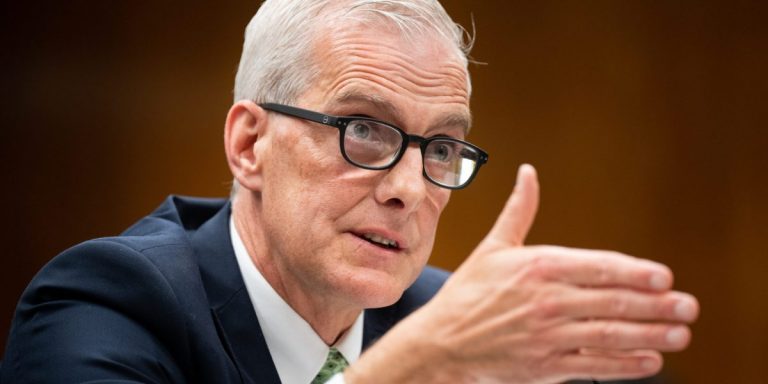

President Biden believes that we, as a nation, have a sacred obligation to prepare and equip the troops we send into harm’s way and to care for them and their families when they return home. The second part of that sacred obligation is ours to fulfill at the Department of Veterans Affairs (VA), and we have more than 400,000 employees who work tirelessly to do exactly that. Veterans have served our country, and now, it’s our job at the VA to serve them.
Over the past few years, our team at the VA has stepped up for Veterans in many ways, even in the midst of a once-in-a-generation pandemic. We’ve delivered health care and benefits for Veterans, their families, caregivers, and survivors at record rates. We’ve expanded access to VA services for millions of toxic exposed Veterans through the historic PACT Act, which was the biggest expansion of Veteran care and benefits in generations. We’ve increased care and services for women Veterans, our fastest-growing cohort of Veterans. And we’ve taken several steps to better serve Veterans in need, including homeless Veterans and Veterans at risk of suicide. All told, the VA is now delivering more care and more benefits to more Veterans than ever before in our nation’s history.
But we cannot–and will not–rest here. Our nation’s Veterans deserve the very best, and we are always looking for ways to build a VA culture that helps us better serve them. That’s why, with the end of the public health emergency last year, I announced a plan to increase in-person work for the VA National Capital Region employees and senior executives who primarily teleworked during the pandemic.
It’s important to note that the vast majority of the VA’s workforce worked in person every day during the pandemic, serving Veterans at VA hospitals, care centers, or cemeteries. But some of the VA’s employees did primarily telework during the pandemic for safety reasons. And now, following last year’s guidance, our National Capital Region employees and senior executives spend at least 50% of their time back in the office.
We made this change because I strongly believe that in-person engagement enhances problem-solving, sparks creativity, and strengthens the connections that make us more productive and successful in our core mission to support Veterans. In-office work also helps us better develop the next generation of VA leaders and accelerates onboarding and learning for new employees, a particular priority when so much of our workforce at VA is already eligible for retirement. Most importantly, we’ve found that working together in person strengthens our growing workforce and our ability to serve Veterans.
Studies show that in-person discussions are better at facilitating creative thinking than video conferencing or other methods of remote communication. Workers who do not regularly see colleagues stay more static and siloed, making it harder for employees to obtain and share new information, including from connections that may develop across and in between meetings. In-person work also provides a stronger foundation for sharing institutional knowledge and keeping our networks diverse and growing.
Many of the benefits from in-person work come from the informal conversations–in the hallway, the break room, or the cafeteria. I regularly eat in our canteen at the VA Central Office, and as employees have begun coming back to the office, I’ve had many valuable, informative exchanges over lunch. We’ve also greatly increased the frequency of in-person meetings, which has helped us work through challenges big and small. I’ve dropped in on some of these meetings and witnessed firsthand the dialogue and robust engagement that result from sitting across from each other.
Our culture at the VA is also built upon a foundation of transparency–it’s a culture where we ask that good news travels fast, but bad news travels even faster. That way, whenever we identify that a Veteran is having a problem, we can immediately identify that problem, understand it, and address it without delay. Being with our colleagues is a critical step toward making that goal a reality.
Make no mistake, VA will still take advantage of the flexibilities of a hybrid work schedule to maximize efficiency and effectiveness while continuing to attract, retain, and compete for talent. But we at VA know that we’re better able to serve Veterans when we build camaraderie and connection, and there is no better way to do that than spending time together in person.
The VA’s public servants are the heart and soul of our organization, and I am grateful for and inspired by their work to support Veterans. The transition back to the office is not an overnight process, and we will continue to work with these employees every step of the way to ensure that they have the tools and environments they need to continue their critical work to deliver for the American people. And, as always, we will do this with one goal in mind: delivering results for Veterans, their families, caregivers, and survivors.
Denis McDonough is the Secretary of Veterans Affairs.
More must-read commentary published by Fortune:
- The markets are starting to realize just how hawkish the Fed is–and reckoning with higher-for-longer interest rates
- Working fathers are the new target of microaggressions–and they are worried they could be getting ‘daddy tracked’
- WEF president: ‘It’s time to revitalize trade—and reverse the trend of Slowbalization’
- The anti-DEI movement has gone from fringe to mainstream. Here’s what that means for corporate America
The opinions expressed in Fortune.com commentary pieces are solely the views of their authors and do not necessarily reflect the opinions and beliefs of Fortune.
Source:Denis McDonough , fortune.com, [publish_date
Source Link